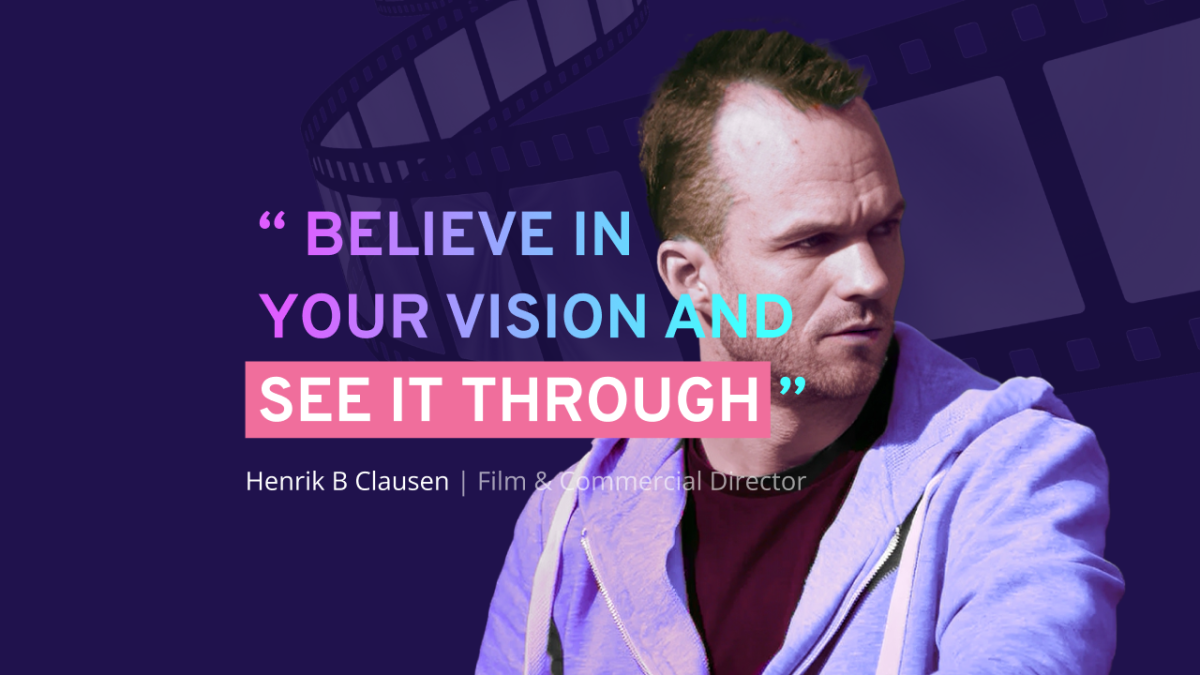Film Director Henrik Bjerregaard Clausen unveils the art and challenges of filmmaking in an exclusive interview with Pzaz.

Earlier this year, we sat down with Henrik Bjerregaard Clausen, an experienced Danish film director, to learn more about his journey in filmmaking.
In our interview, Henrik talked about change in the film industry, the democratisation of filmmaking tools, and the role of generative AI, as well as other topics.
We enjoyed that conversation so much that we decided to invite Henrik back and hold a follow-up interview. In this second conversation with Henrik, we delved even more deeply into some of his thoughts on the film industry.
Henrik Bjerregaard Clausen, a seasoned Danish film director, shares profound insights into the evolving landscape of filmmaking and the essential skills required to thrive in the industry. In this exclusive interview, Henrik discusses the transformative impact of generative AI, the significance of goal setting in film projects, and the art of balancing personal and professional priorities.
Navigating the dynamic film industry demands a clear understanding of project goals. Henrik underscores the importance of delineating commercial objectives from the outset, whether aiming for career advancement, festival recognition, or valuable learning experiences.
Reflecting on the changing terrain of visual effects and filmmaking, Henrik offers valuable perspectives on adapting to industry shifts. As a recent parent himself, he provides candid insights into managing conflicting priorities and achieving work-life balance.
Time management emerges as a critical factor in filmmaking success. Henrik stresses the need for efficient use of resources, particularly on set where every moment translates into financial investment.
Henrik’s dedication to education is evident in his collaboration with students and institutions. He emphasizes the importance of practical experience and interdisciplinary knowledge in shaping future filmmakers.
In a competitive landscape, originality is paramount. Henrik encourages aspiring filmmakers to infuse their work with unique perspectives and personal sensibilities, rather than emulating established masters.
Furthermore, Henrik advocates for active application of acquired knowledge, emphasizing the value of hands-on experience in reinforcing learning and expanding professional networks.
As Henrik’s influence continues to grow, those interested in exploring his work can visit his website for a comprehensive collection of videos and resources. Additionally, figment.dk offers a glimpse into Henrik’s innovative tools for video effects artists.
Henrik Clausen’s journey exemplifies resilience, creativity, and a commitment to excellence in filmmaking. His insights serve as a guiding light for aspiring filmmakers navigating the ever-changing landscape of the industry.
Creating and managing one’s goals within the scope of a film project.
Time is often the enemy of filmmakers during their projects. This is why it is important to define the goals of every film project.
Henrik explained how his goals for his projects have changed dramatically over the course of his career. This ranges from as a young visual effects artist, wanting to impress his peers and gain recognition, to now as a more mature filmmaker managing the commercial goals of a project. and your resources.
“When I started,” Henrik explained, “I didn’t have specific or at least not very thought-through commercial goals in terms of ‘once this film is completed, then what is it, what’s going to happen’?” But he has since learned over the years to define such questions clearly. As Henrik explains, it’s important when embarking on a project to know clearly what you want the outcome to be. In Henrik’s words, “Is it going to get you further on in your career as a showpiece or a springboard to do a feature film based on a short film? Or, is it just a neat little package [from which you] then you learn a tonne, and you can put it on the festival circuit?”
The changing landscape of the film industry, since Henrik first began shooting.
The environment for visual effects artists and filmmakers has changed dramatically over the last few decades. We discuss what effect this has had on Henrik’s work and perhaps the industry as a whole.
In recent years Henrik has become a parent for the first time. We explore what impact this has had on his work, and what advice he would give to other people who have to balance many conflicting priorities.
The importance of time management, especially when on set.
Whether you’re working alone, says Henrik, or as part of a professional team, or even with students at a school or college, “it’s all about time management.” Why is this so important? “You have a limited number of days,” explains Henrik. “Every day costs money so you have to maximise the amount that you can get done in the days available… Any little thing where it’s taking away from that, is costing money and adds up.” This is clearly a skill that takes practice to cultivate.
The work Henrik currently does with education institutions and coaching students
We delve into Henrik’s work with students and higher education establishments. We talk about how Henrik believes he benefited from these arrangements, what he has learned from this sort of work and what advice he would give to new students or others just embarking on this path for the first time.
We also explore some of the key skills that Henrik believes it is most helpful for students and young people to cultivate early, when entering this profession. “It’s a really good idea to get at least a minimal knowledge of different departments and what they do because it’ll just help smoothen out so much of the work”, Henrik explains. Communication, I suggest, is a critical skill for all filmmakers, even when they are just starting out.
The importance of originality in a filmmaker’s work, and using this to stand out from the crowd.
Henrik has stated before that growing up, he was hugely influenced by American science fiction and drama directors like James Cameron, David Fincher, and Ridley Scott. And yet, in this conversation we reflect on the fact that to stand out today as a filmmaker, it is more important than ever to be truly original, and to make work that has not been seen before. “When I started filmmaking… the thing that inspired me to try my hand at filmmaking… was my heroes from the nineties… Cameron, Fincher, and Scott,” Henrik says. “And that’s fine, to be inspired by that. So what’s changed? “I also feel like now both in my own work and in a lot of the work that I see from other people of my generation, we have had a tendency to try and do that, and copy that.” I wonder what, then, is the alternative; it’s clearly not enough any more to simply try and emulate your heroes. As Henrik explains, you need to take what you love about others’ work, and add your own unique sensibility to it. Originality, it seems, is the number one priority.
It is crucial to be sure to apply lessons learned… the difference between ‘Learning/consuming’ versus ‘doing’.
In today’s society, Henrik and I observe in this conversation, there is more information available than ever before in human history. So it is very easy for people to consume more and more information on a subject, but not actually take any action towards achieving a goal. As Henrik explains, his advice to other filmmakers today is to make sure to apply what they have learned to a real-world project. Rather than simply learning information from a video and moving on, he argues, take the time to apply what you’ve learned to a real project – preferably one involving other people. That will cement what you’ve learned, help you develop other skills, and most importantly, expand your network.
It’s important to balance work with family life.
Henrik became a father just over two years ago. I have a son who is six years old, so we exchanged our points of view on how our new family lives have impacted our work. “It’s a lot of work,” admits Henrik. “But it does get easier as she grows up a little bit and becomes more capable. It’s already become easier now.” I reassured him that as his daughter grows up even more, that will continue.
Where to find out more about Henrik and his work.
You can watch many of Henrik’s videos, including his shorts, trailers, and breakers, at http://henrikbclausen.com/.
You can also find out more about Henrik’s animated textures and assets tools for video effects artists, at figment.dk.
Chapters in the YouTube interview video:
00:00 – Intro
00:21 – Introducing today’s guest
01:10 – Henrik’s career and background
04:53 – Setting goals for a film project
08:05 – Hitting the front page of YouTube
12:15 – The requirements to do commercial work
14:00 – How does Henrik balance between commercial and personal projects
19:00 – The difference between working with student versus professionals
19:23 – The soft skills that Henrik thinks are most important to learn
26:05 – How can filmmakers set themselves apart
33:57 – Thinking about the future
35:34 – What would Henrik do differently in his past
39:57 – Why you shouldn’t just “write what you know”
43:08 – Henrik’s current projects


